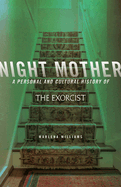
"[D]on't watch The Exorcist" is the warning of a mother to her daughter in Marlena Williams's Night Mother, a mesmerizing mix of cinematic, cultural, and personal history. Based on the novel by William Peter Blatty and filmed by award-winning director William Friedkin, The Exorcist was a movie, Williams writes, that helped make "fear of the devil pressing and real." Her mother, who defied her mother's wishes not to see it when it released in 1973, was scarred by the movie and felt it would scar her daughter, too.
Williams dissects The Exorcist's most iconic scenes and finds parallels in her own Catholic upbringing and rebellion, even the real-life horror of her mother's losing battle with cancer. Seeing the movie as "just a story about a mother and a daughter," Williams pivots seamlessly between film history, sexism, racism, and the female body, as she plumbs fraught memories and emotions. Williams resonates with Father Karras and applauds the film, which she describes as "haunted by dead mothers," for daring to "confront the comingling of grief and guilt in all its raw, debilitating intensity." Some of Williams's cultural critiques are debatable, as when she claims the demonic Regan can be understood as the "snarling and vengeful embodiment of white anger" at societal gains made by Black Americans after the civil rights movement. But overall, Night Mother--an unorthodox love letter in which Williams attempts to exorcise her own demons--is a powerful reckoning. --Peggy Kurkowski, book reviewer and copywriter in Denver

